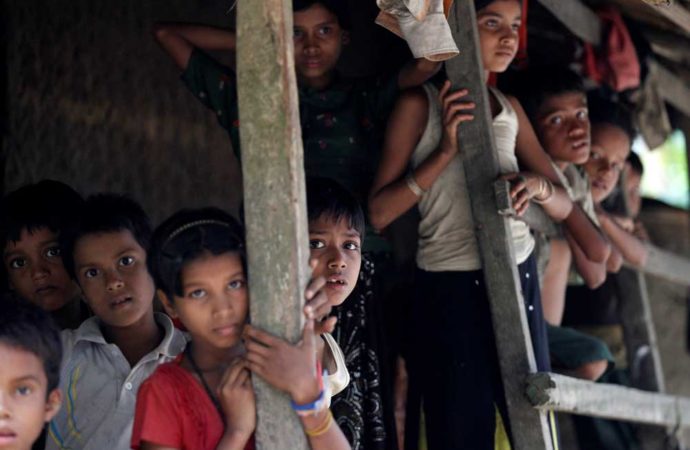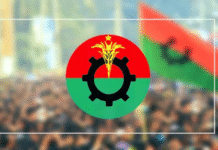Why is Aung San Suu Kyi still silent?
“I think that if you live under a dictatorship for many years, people do not like to trust one another — a dictatorship generates a climate of mistrust,” Aung San Suu Kyi told Mishal Hussein of the BBC in 2013 when questioned about the persecution of Rohingyas in Myanmar.
The dictatorship in question is, of course, the military junta which ruled over Myanmar from 1962-2011, and which still holds significant leverage over political life by way of important ministerial portfolios such as Defense and Border Affairs, and the uncontested right to a quarter of the seats in both houses of the legislature.
It was under this military rule that Suu Kyi was elevated to the pantheon of human rights defenders, with the Nobel Committee, in 1991, awarding her the Peace Prize for being an “important symbol in the struggle against oppression,” most prominently for her efforts at spearheading the popular 8888 Uprising which attempted to topple the failed administrators of the “Burmese way to socialism.”
It is, without a doubt, that Myanmar’s military regimes were unadulterated disasters. All the usual boxes of tyranny were ticked: Economic stagnation, suppression of dissent, arbitrary detention, etc.
Even in 1990, when free and fair elections announced Suu Kyi’s National League for Democracy as the majority party, the military rolled back on its promises to relinquish power and sent the country back down the rabbit hole of uncertainty.
More to Suu Kyi’s argument about the “climate of mistrust,” is the military’s single most potent footprint: Ethnic conflict.
The military regimes of the past have used the full brunt of the state machinery to suppress and sequester ethnic minorities. In Myanmar today, if you can name a minority population, you can be sure they are presently or had been at one time or another in conflict with the military.
The Shans, Myanmar’s largest minority group, have been tormented by the Tadmadaw for decades, and often communities have had to flee to neighbouring Thailand; because of this, many armed organisations such as the erstwhile Shan National Army have sprouted up seeking self-determination for the group.
The story begins to take on a coherent narrative as one traverses across Myanmar’s geographical landscape. The Karen National Liberation Army has been fighting the government since 1949 for the establishment of an autonomous “Kawthoolei” state. The Karen conflict has been called the “world’s longest running civil war.” The Kachin war was also resuscitated in 2011 after a 17 year hiatus.
In each of these fronts, the crimes of successive governments are familiar though no less depressing: Rape, torture, displacement, forced labour, and child soldiers.
The government has even resorted to using ostensibly less nefarious, though no less damaging in the long term, formulas to curtail advancement and progress in minority populated regions. The crumbling transportation infrastructure, for example, provides a blueprint for inequity and according to the ADB “after decades of under-investment, provides poor access to markets and services, perpetuates poverty and regional inequality.”
And then we have the Rohingyas who don’t even have the right to be called citizens. Who are relegated to realms of “boat people” and “floating coffins,” or their moniker in diplomatic circles: “The most persecuted minority in the world.”
But that was under military rule.
Surely, the newly elected government of Suu Kyi, the champion of human rights, will make efforts to alleviate some of the sufferings, right? After all, she has an esteemed record in fighting against injustices, and now that she holds power, all the bulwarks that stood against reconciliation must fall.
Behind the curtains lies a shrewd political operator with her finger on the pulse of a population that has, for decades, endured military rule. The Rohingya issue is simply a political landmine in Myanmar, destined for the quagmire, derided as ‘identity politics’
But here’s the catch. “Why won’t she say anything about the Rohingyas?” is the question on everyone’s lips. The answer is far less sensationalistic and more disturbing than it may seem.
There are no votes in it.
Many in the majority Bamar population hold deep-rooted prejudices against much of the non-Buddhist minorities, including Rohingyas. The burgeoning 969 movement led by monk Ashin Wirathu has fanned religious tensions and scapegoated Muslims as the cause for the country’s ills. This extremist movement reared its ugly head during the 2012-2013 anti-Muslim campaign all over Myanmar, especially in Rakhine state.
Suu Kyi’s party won a super-majority in both chambers of parliament in the 2015 general election, largely on the back of support from the Bamar majority. Even though it is true that the NLD also won many unexpected seats in minority regions, like Kachin, the fact remains that the Buddhist Bamar vote was pivotal in her party’s landslide victory.
Do not let Suu Kyi’s seemingly spotless activism fool you.
Behind the curtains lies a shrewd political operator with her finger on the pulse of a population that has, for decades, endured military rule. The Rohingya issue is simply a political landmine in Myanmar, destined for the quagmire, derided as “identity politics.” Any proximity to it risks provoking the ire of Myanmar’s Buddhist Nationalist lobby, who hold significant clout as pressure groups.
Even the best politicians are no good without power. And Suu Kyi seems to have decided that keeping mum on the plight of the Rohingyas is the best course for action. Rohingyas have taken backseat to the buzzword of “national reconciliation.”
While it is true that decades of mismanagement has left Myanmar in a deeply polarised state of decay, the argument that some issues are more important than others does not hold water in this case. Constitutional reform rings hollow when one million of the country’s inhabitants live under the threat of ethnic cleansing
Bangladesh and the UNHCR do indeed have a humanitarian duty to accept the Rohingya refugees who are crossing the border, but the international community must not let Suu Kyi’s new government off the hook while it pursues more politically expedient policy goals.
The same governments that bestowed upon her honorific titles and prizes, must take responsibility to remind her that she is the leader of all Burmese people, including Rohingyas, and not just the ones she sees as vote banks.
Source : Dhaka Tribune










